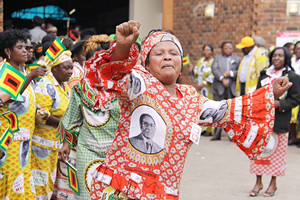
Women rally at the ZANU-PF National People's Conference held in Bulawayo. The revolutionary party and founder of modern Zimbabwe is preparing for elections in 2013., a photo by Pan-African News Wire File Photos on Flickr.
Women venture deep into politics
Friday, 22 February 2013 00:00
Gender Forum Fortious Nhambura
Zimbabwe Herald
Last week women from different political parties met in Harare to, among other things, discuss women’s participation in the forth-coming referendum and elections. The meeting, convened by the Women in Politics Support Unit also sought to ensure that women deliberately use the forth-coming elections to assert their priorities in the governance of Zimbabwe.
The meeting highlighted the growing need for women’s participation in politics on the lower and upper levels of the national body politick.
This brought to the fore the importance of citizen participation particularly of the fairer sex to ensure their interests, concerns and priorities are incorporated in national development. Gender activists are agreed that women’s participation in shaping national politics has been lagging behind in Africa in general and Zimbabwe in particular.
A lot has been said about the need to promote participation of women in politics though the actual situation on the ground is not reflective.
If Zimbabwe’s potential is to be realised, it is time to deliberately encourage women participation in politics. Participation of women in politics can be done on a number of levels all that are critical in shaping their development and of the country. They participate in the politics through registering as voters. Although some may say women have been voting in the country’s elections since 1980, vote has not been necessarily used to advance their in life which remains behind that of their male counterparts.
In most cases they have voted for men who have gone to use powers gained from these positions to suppress advancement of females. It is unfortunate that women have not been informed of the potential power they hold because of their numbers can indeed be used to push for empowerment.
Women can also join at the level of contesting elections. They can present themselves as candidates in the coming elections. This can be done through joining political parties of their choice or choosing to contest as independent candidates. While the latter can be an option it is critical for women to note that in African politics independent candidate’s chances are very slim hence the need to have a political party backing one’s candidature. With the draft constitution providing 60 seats in Parliament and expected to sail thorough the referendum, there is more for women to gain by joining or forming own political parties.
Participation in politics can also be on the level of joining the campaign team. In the event they do not want to be candidates, women can campaign for other female candidates through offering technical and solidarity support. This will help secure votes for women’s candidature.
With women contributing more than 51 percent of the population they can easily influence the national vote. As such any nominal representation by women should be avoided at all costs.
The women should be at the forefront in efforts to level the playing field for both sexes to ensure that they also become important players in the way the country’s politics progress.
What is important is for our women to compete in an environment which is conducive for them to stand. Such position should be decided on merit hence the need for equal participation from grassroots. Once positions are held on merit it would be easy for women to push their agendas and thus influence national development.
The education sector has clearly shown that achieving anything on merit brings respect.
Educated women are respected in the society because it is known that they were not catapulted to current positions because of dubious criteria but because of working hard.
The coming election offers a rare opportunity for women to increase their participation in politics but some may ask why enter politics?
As stated above female participation in politics ensures that all political decisions made take account of women’s perspectives and concerns on legislation and policies that govern the country.
For WIPSU women should participate in politics because:
--To assume positions of power and hold key positions for decision making that will ensure that their concerns are represented at all levels of decisions making.
--To help transform laws and policies that advance women’s rights, human rights and promote gender equality towards equal access and control resources and opportunities. It will also ensure equal access to land, economic resources, jobs and social services among other things.
--To ensure implementation of development and governance programmes that are gender sensitive and take into account the concerns of women.
--To inspire, mobilise and support the women already in politics and political leadership positions.
--They exercise the right to vote for leaders of their choice and ensure government implements mechanisms for women advancement.
--To represent and make decisions sensitive to the electorate and the marginalised. Women make the bulk of the people that are marginalised and underprivileged.
--To instil peace, political; tolerance and ensure active participation of citizens in elections.
If politics involve the balancing of different values, thoughts and opinions to achieve a collective purpose of running the affairs and matters of a country, it is thus critical that the country increase women in politics.
Surely by ignoring more than half of the population in decision making is disastrous and should be avoided at all cost.
No comments:
Post a Comment